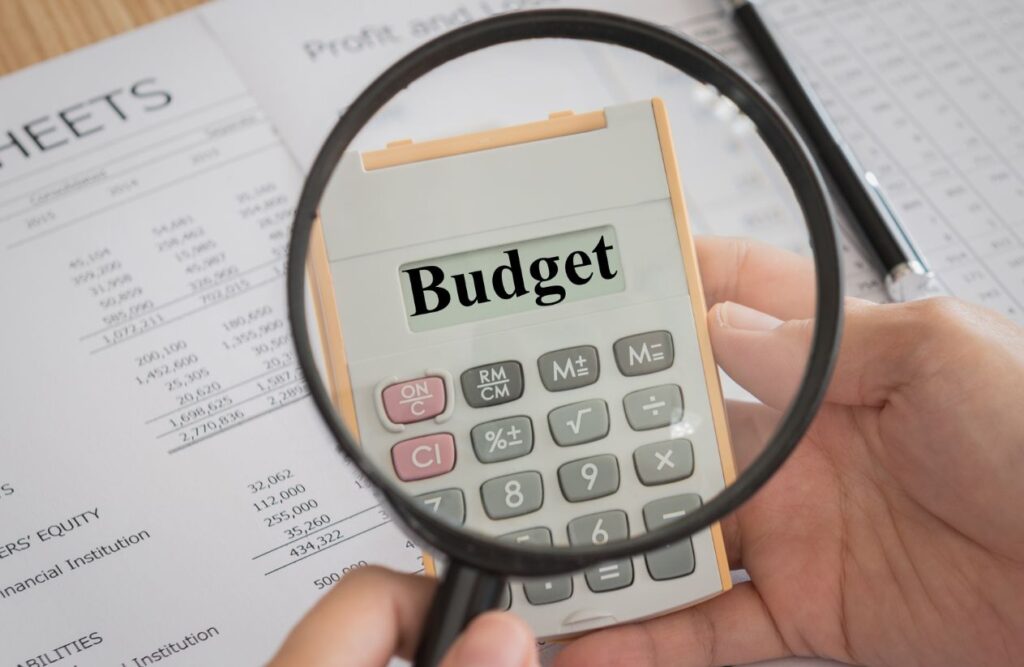Picture this: you’re at a party, the food’s decent, the venue’s okay, but the entertainment? Crickets. It can really kill the vibe, right? Or, imagine the opposite: a band so good, a DJ who knows exactly how to read the crowd—suddenly, it’s a night everyone remembers.
Whether you’re dreaming of a surprise celebrity appearance or looking to hire a killer local band, figuring out how to build a budget for event entertainment is essential.
Blow your entire budget on the entertainment, and you might be left with nothing for other crucial elements. Skimp too much, and your event might fall flat.
This guide offers a practical, step-by-step approach to crafting an entertainment budget that works, ensuring your event is a hit without emptying your wallet.
Defining Your Entertainment Needs (Understanding the Event)

Before you even start thinking about booking a band or DJ, you need to understand the event itself. This means digging into a few key areas:
- Target Audience: Who are you trying to entertain? This is crucial. Are you planning a party for young adults who love electronic music, or a corporate gala for established professionals who prefer a live jazz band? Knowing your audience’s age, demographics, and interests will heavily influence your entertainment choices. For example, a children’s birthday party might call for a magician or a costumed character, while a retirement party might be better suited for a nostalgic cover band.
- Event Type and Purpose: What kind of event are you hosting? A wedding reception calls for different entertainment than a product launch. A corporate holiday party might need something more interactive than a simple DJ set. The purpose of the event dictates the tone and style of entertainment you should choose. A formal awards ceremony, for instance, would likely benefit from a sophisticated string quartet or a solo pianist, while a casual company picnic might be perfect for a fun, energetic cover band.
- Venue and Space: The venue plays a big role in your entertainment planning. Is it an intimate indoor space or a sprawling outdoor venue? The size of the space will determine the scale of entertainment you can accommodate. A small room won’t be suitable for a large band with lots of equipment, while a massive outdoor space might swallow up a solo acoustic performer. Also, consider the venue’s technical capabilities. Does it have a stage, sound system, and lighting? If not, you’ll need to factor in the cost of renting these.
- Desired Atmosphere/Mood: What kind of vibe are you going for? Do you want the event to be high-energy and get everyone dancing, or are you aiming for a more relaxed and sophisticated ambiance? The entertainment should enhance the overall mood you want to create. A lively DJ set can create an energetic party atmosphere, while a smooth jazz band can set a more sophisticated and relaxed tone. Think about the overall feeling you want guests to walk away with and choose entertainment that aligns with that vision.
You can also read our article about: Things You Must Know Before Hiring Event Talent
Exploring Entertainment Options (From Headliners to Local Gems)

Now that you understand your event’s needs, it’s time to explore the exciting world of entertainment options.
This is where knowing how to build a budget for event entertainment really comes into play, as the cost range can vary dramatically. Let’s look at the spectrum:
- Celebrity/Headline Performers: Booking a big name can bring instant prestige and excitement to your event. Imagine having a chart-topping musician or a well-known comedian take the stage. The pros are obvious: increased attendance, media attention, and a truly memorable experience. However, the cons are equally significant: astronomical costs, complex contracts, and often demanding logistical requirements. Booking these performers usually involves working with agents who handle negotiations, contracts, and technical riders. If you’re considering this route, be prepared for a significant investment and ensure it aligns with your overall budget.
- Professional Bands/DJs: Professional bands and DJs offer a wide range of styles and genres, catering to diverse tastes. From high-energy cover bands that get everyone on the dance floor to sophisticated jazz ensembles perfect for a cocktail hour, the options are plentiful. When searching for reputable musicians, look for online reviews, recommendations from other event planners, and professional websites or portfolios. Consider attending live performances to get a feel for their stage presence and musical style. This option offers a good balance of quality entertainment and manageable costs, but it’s still important to factor in travel expenses, equipment rentals, and other potential costs when considering how to build a budget for event entertainment.
- Local Talent (Bands, DJs, Solo Artists, Comedians, etc.): Supporting local talent offers numerous advantages. Not only is it often more cost-effective, but it also fosters a sense of community and provides a platform for talented artists. Local bands, DJs, solo artists, comedians, and other performers can bring just as much energy and excitement to your event as more established acts, often at a fraction of the cost. Finding local talent can be as simple as attending local music venues, checking online directories like Gigsalad or local arts councils, or asking for recommendations from friends and colleagues. This is a great option for those looking to maximize their entertainment budget without sacrificing quality. It’s a key component of how to build a budget for event entertainment on a smaller scale.
- Other Entertainment Options: Beyond musical acts, there’s a world of other entertainment possibilities. Magicians, dancers, interactive performers, fire breathers, and even caricature artists can add a unique and memorable touch to your event. These options can be particularly effective for themed events or when you’re looking for something different and engaging. While these options can vary in cost, they are important to consider when figuring out how to build a budget for event entertainment that is unique and memorable.
This section provides a good overview of the different entertainment options available, and it emphasizes the importance of considering cost and budget at every level.
Setting a Realistic Budget (The Numbers Game)

Now for the nitty-gritty: setting a realistic budget. This is where all the planning comes together, and knowing how to build a budget for event entertainment becomes paramount. Here’s how to approach it:
- Total Event Budget: Before you allocate a single penny to entertainment, you need a clear picture of your overall event budget. How much money do you have to work with in total? This will give you a framework for determining how much you can realistically spend on entertainment. A common practice is to allocate a percentage of your total budget to entertainment. This percentage can vary depending on the type of event and how important entertainment is to its success. For example, at a wedding, entertainment might take up 10-20% of the total budget, while for a music festival, it might be the majority of the budget.
- Prioritizing Entertainment: Is entertainment the main focus of your event, or is it a supporting element? This will directly impact how much of your budget you should allocate. If entertainment is a top priority, you’ll naturally dedicate a larger portion of your funds to it. If it’s more of a background element, you can allocate a smaller amount. Be honest with yourself about the role entertainment plays in the overall success of your event. This will help you make informed decisions about spending.
- Creating a Spreadsheet or Budgeting Tool: Tracking expenses is essential. A simple spreadsheet or budgeting tool can be a lifesaver. List all potential entertainment costs, including performer fees, equipment rentals, travel expenses, and any other related costs. This allows you to see where your money is going and make adjustments as needed. Using a spreadsheet also makes it easy to compare quotes from different entertainers and make informed decisions. This is a critical step in how to build a budget for event entertainment effectively.
- Contingency Fund: Unexpected costs happen. It’s always wise to include a contingency fund in your entertainment budget. This is a buffer for unforeseen expenses such as equipment malfunctions, last-minute changes, or even unexpected gratuities. A good rule of thumb is to set aside 10-15% of your entertainment budget as a contingency. This will give you peace of mind knowing you have a cushion in case something goes wrong. This is a crucial part of how to build a budget for event entertainment that can handle surprises.
By following these steps, you can create a realistic entertainment budget that aligns with your overall event goals and prevents any financial surprises down the road.
Negotiating and Booking Entertainment (Getting the Best Value)

Once you’ve set your budget and chosen your entertainment, it’s time to negotiate and book. This stage is all about getting the best value for your money. Here’s how to approach it:
- Researching Rates and Fees: Before contacting any performers, do your research. Get a sense of typical rates for the type of entertainment you’re seeking. Online resources, industry publications, and even asking other event planners can give you a good benchmark. When contacting performers for quotes, be clear about your event details: date, time, location, and the type of performance you’re looking for. Get quotes from multiple performers to compare prices and services. Don’t be afraid to ask for a breakdown of their fees, including travel, equipment rental, and any other potential charges. This is a crucial step in how to build a budget for event entertainment that maximizes value.
- Negotiating Contracts: Once you’ve chosen a performer, it’s time to finalize the agreement with a contract. This legally binding document protects both you and the performer. Key contract points to consider include:
- Performance Time: Clearly specify the start and end times of the performance, as well as any breaks.
- Technical Requirements: Outline any specific equipment the performer needs, such as sound systems, lighting, or stage setup. Who is responsible for providing these?
- Payment Terms: Clearly define the payment schedule, including deposit amounts, payment deadlines, and acceptable payment methods.
- Cancellation Policies: What happens if the event is canceled or the performer can’t make it? Make sure the contract outlines clear cancellation terms for both parties.
- Liability and Insurance: Ensure the performer has appropriate liability insurance in case of any accidents or damages.
- Working with Agents vs. Booking Directly: You have two main options for booking entertainment: working with an agent or booking directly with the performer. Each approach has its pros and cons:
- Working with an Agent: Agents typically have access to a wider range of talent, can handle negotiations and contract details, and can often secure better deals due to their established relationships. However, they also charge a commission, which can increase the overall cost.Booking Directly: Booking directly with the performer can save you money on agent fees. However, it requires more work on your part, as you’ll be responsible for handling all negotiations, contracts, and logistics.
Consider your budget, time constraints, and comfort level when deciding which approach is right for you.
If you’re working with a limited budget and have the time to handle the details yourself, booking directly might be the better option. If you’re looking for a hassle-free experience and are willing to pay for the convenience, working with an agent might be the way to go.
This decision is a key factor in how to build a budget for event entertainment that aligns with your resources and preferences.
Managing Entertainment on the Day (Smooth Execution).

The big day is here! All your planning and budgeting comes down to this. Effective management on the day of the event is crucial for a successful entertainment experience.
This is where careful execution ensures you get the most out of the budget you’ve created. Knowing how to build a budget for event entertainment is only half the battle; managing the entertainment on the day is just as important. Here’s how to ensure smooth sailing:
- Communication with Performers: Clear and consistent communication is key. Before the event, confirm all details with the performer, including arrival time, setlist (if applicable), and any last-minute changes. On the day of the event, designate a point of contact to communicate with the performer and address any immediate needs. This ensures everyone is on the same page and prevents misunderstandings.
- Technical Requirements and Logistics: Ensure all technical requirements are met. This includes sound, lighting, stage setup, and any other equipment specified in the contract. If the venue is providing the equipment, confirm that it’s functioning correctly. If you’re renting equipment, ensure it’s delivered and set up on time. Conduct a soundcheck before guests arrive to ensure everything sounds good. Having a checklist of all technical requirements can be very helpful.
- On-Site Coordination: Designate a point person to manage the entertainment on the day of the event. This person will be responsible for:
- Greeting the performer upon arrival.
- Ensuring the stage or performance area is set up according to the contract.
- Coordinating with the venue staff regarding any technical needs.
- Managing the performance schedule and ensuring everything runs on time.
- Addressing any issues that may arise during the performance.
Having a dedicated on-site coordinator allows you to focus on other aspects of the event and ensures the entertainment runs smoothly. This dedicated person can also help ensure that the agreed-upon terms of how to build a budget for event entertainment are being upheld.
By paying attention to these details, you can ensure a seamless and enjoyable entertainment experience for both your guests and the performers.
Related Content:How to Hire a Celebrity for Corporate Events and Brand Activations
Conclusion: Making Your Entertainment Budget Work for You
Creating memorable event entertainment doesn’t require endless spending. It’s about smart planning and strategic budgeting. From understanding your audience to negotiating contracts and managing the day itself, each step plays a vital role.
Knowinghow to build a budget for event entertainment is the cornerstone of a successful event. It’s about balancing your vision with your financial resources. By prioritizing, planning, and staying organized, you can ensure your entertainment enhances your event and creates lasting memories.
Don’t be afraid to explore different options and negotiate for the best value. With careful planning, your event entertainment will be a resounding success.
If you are searching for talent, below is the list of our recommended talents that you can book or hire for the event:






